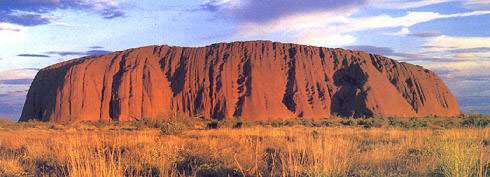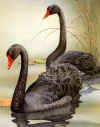
Vonda Stanley's collection of early Australian bush poems
Andrew Barton (Banjo) Paterson was born at Narambla in New South Wales in 1864 and lived until 1941. Over his life "Banjo" worked as a farmer, lawyer, newspaper editor, but his heart was in the country. He is among the best known of the early Australian bush poets for his works like "The Man From Snowy River; Saltbush Bill; and Clancy of the Overflow", but he also wrote much more, including this lovely piece about Australia's native black swans.

Black Swans
As I lie at rest on a patch of clover
In the Western Park when the day is done.
I watch as the wild black swans fly over
With their phalanx turned to the sinking sun;
And I hear the clang of their leader crying
To a lagging mate in the rearward flying,
And they fade away in the darkness dying,
Where the stars are mustering one by one.
O ye wild black swans, 'twere a world of wonder
For a while to join in your westward flight,
With the stars above and the dim earth under,
Trough the cooling air of the glorious night.
As we swept along on our pinions winging,
We should catch the chime of a church-bell ringing,
Or the distant note of a torrent singing,
Or the far-off flash of a station light.
From the northern lakes with the reeds and rushes,
Where the hills areclothed with a purple haze,
Were the bell-birds chime and the songs of thrushes
Make music sweet in the jungle maze,
They will hold their course to the westward ever,
Till they reach the banks of the old grey river,
Where the waters wash, and the reed-beds quiver
In the burning heat of the summer days.
O ye strange wild birds, will ye bear a greeting
To the folk that live in that western land?
Then for every sweep of your pinions beating
Ye shall bear a wish to the sunburnt band,
To the stalwart men who are stoutly fighting
With the heat and drought and the dust-storm smiting,
Yet whose life somehow has a strong inviting,
When once to the work they have put their hand.
Facing it yet! O my friend stout-hearted,
What does it matter for rain or shine,
For the hopes deferred and the grain departed?
Nothing could conquer that heart f thine.
And thy health and strength are beyond confessing
As the only joys that are worth possessing.
May the days to come be as rich in blessing
As the days we spent in the auld lang syne.
I would fain go back to the old grey river,
To the old bush days when our hearts were light;
But, alas! those days they have fled for ever,
They are like the swans that have swept from sight.
And I know full well that the strangers' faces
Would meet us now is our dearest places;
For our day is dead and has left no traces
But the thoughts that live in my mind to-night.
There are folk long dead, and our hearts would sicken--
We should grieve for them with a bitter pain;
If the past could live and the dead could quicken,
We then might turn to that life again.
But on lonely nights we should hear them calling,
We should hear their steps on the pathways falling,
We should loathe the life with a hate appalling
In our lonely rides by the ridge and plain
~~~~~~~~~~~~~~~~~~~~~~~~~~~~~~
In the silent park a scent of clover,
And the distant roar of the town is dead,
And I hear once more, as the swans fly over,
Their far-off clamour from overhead.
They are flying west, by their instinct guided,
And for man likewise is his rate decided,
And griefs apportioned and joys divided
By a mightly power with a purpose dread.
******
© A B Paterson